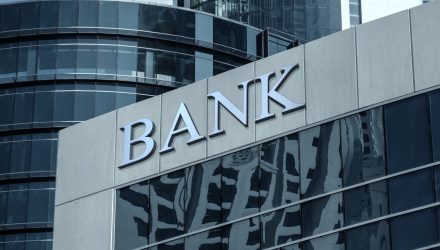Bank stocks and ETFs are responding positively to the renomination of Chairman Jerome Powell, who helmed the Federal Reserve and the nation’s economy through the dramatic and abrupt coronavirus-induced recession by utilizing unprecedented monetary stimulus.
President Biden announced Powell’s renomination on Monday morning, after protracted concerns investors might see Fed Governor Lael Brainard replace Powell instead.
“As I’ve said before, we can’t just return to where we were before the pandemic, we need to build our economy back better, and I’m confident that Chair Powell and Dr. Brainard’s focus on keeping inflation low, prices stable, and delivering full employment will make our economy stronger than ever before,” Biden said in a statement.
The nominations are not yet complete, however, and will head next to the Senate for confirmation.
Biden lauded the Powell Fed for its “decisive” action in the early days of the pandemic, acknowledging its implementation of a historical collection of lending programs, slashing interest rates back to near zero, and instituting a monthly bond-buying program that would increase the central bank’s holdings of Treasurys and mortgage-backed securities by over $4 trillion.
“Chair Powell has provided steady leadership during an unprecedently challenging period, including the biggest economic downturn in modern history and attacks on the independence of the Federal Reserve,” a White House statement said. “During that time, Lael Brainard – one of our country’s leading macroeconomists – has played a key leadership role at the Federal Reserve, working with Powell to help power our country’s robust economic recovery.”
A Stock Run-Up
The announcement coincided with a run-up of stock and index ETF prices, while government bond yields were higher across the board, as bond prices, which run inversely with yields, fell.
The SPDR Dow Jones Industrial Average ETF (DIA) and SPDR S&P 500 ETF Trust (SPY) both continue to show gains in the mid-afternoon session, while the Invesco QQQ Trust (QQQ) is trading off by 0.36%.
Meanwhile, financial stocks have responded enthusiastically to the news, with ETFs like the KBW Bank ETF (NASDAQ: KBWB) up over 2.62% on Monday.
KBWB, which follows the widely observed KBW Nasdaq Bank Index, is up almost 4% over the past month and residing around 52-week highs. That bullishness is notable, as is the fact that bank earnings have multiple tailwinds for 2022 and beyond.
“First, it is expected that the Federal Reserve will begin lifting interest rates, which will widen the spread banks earn between the interest they charge on loans and the interest they pay on in deposits,” reported Carleton English for Barron’s. “Analysts at Oppenheimer note that the Treasury yield curve is forecasting at least one or two rate hikes by 2023, adding that the first hikes are the most’ consequential’ for banks.”
Most Fed officials thus far have said they won’t consider raising rates at least until the bond-buying taper winds down. But markets have been awaiting a swifter timeline for rates, with the initial hike now priced in for June 2022.
“The president chose the status quo for monetary policy and financial regulation,” said Mark Zandi, chief economist at Moody’s Analytics. “The Fed’s going to slowly but steadily take its foot off the monetary accelerator.”
Treasury Secretary Janet Yellen, who also was Powell’s immediate predecessor at the Fed’s helm, also praised Powell for the way he handled the responsibilities of tackling the pandemic recession.
“Over the past few years, Chair Powell has provided strong leadership at the Federal Reserve to effectively meet and address unexpected economic and financial challenges, and I am pleased our economy will continue to benefit from his stewardship,” Yellen said.
A Controversial Bond
While Powell has been praised for his handling of the pandemic, his tenure has also witnessed controversy involving Powell’s and his colleagues’ questionable, personal involvement with bond purchases, as well as fresh, surging inflation, which spiked above the Fed’s 2% target, generating concern on Wall Street and beyond.
Meanwhile, Powell has maintained that inflation will be ephemeral and should cool off once factors associated with the pandemic and supply chain issues return to normal. But the recent readings have sparked doubt about the so-called average inflation targeting that signaled a historic turn in central bank monetary policy.
For investors looking for places to invest amid climbing inflation, analysts have been touting bank stocks as a potentially wise investment vehicle right now.
“US banks are in good shape to maintain their profitability through the current period of elevated inflation, which in our base case will subside in 2022 but settle a little above 2%, on average, long-term. But if high inflation persists beyond this time frame, the potential for negative credit responses by banks will rise,” according to Moody’s Investors Service.
Some bank ETFs to consider aside from KBWB include the SPDR S&P Bank ETF (NYSEArca: KBE) and iShares U.S. Regional Banks ETF (IAT). The latter is up over 2.48% Monday.
IAT gives investors a way to play regional banks, a sub-sector of the financial sector that offers a unique risk/return profile relative to traditional financial exposure. Whereas financial funds such as XLF are dominated by large cap companies, IAT maintains significant exposure to small and mid cap banking stocks, many of which are not impacted by the factors that drive the performance of big Wall Street banks.
For more market trends, visit ETF Trends.
